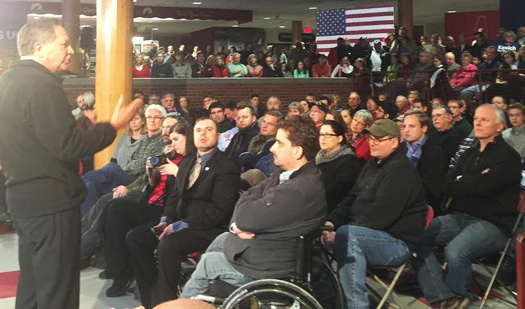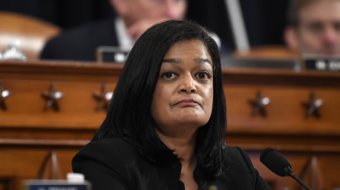
CONCORD, N.H. – Speaking to an all-white audience of about 400 well-dressed people in a high school auditorium here, Ohio Gov. John Kasich demonstrated the difference between himself and other, more boisterous Republican presidential nominee contenders.
The difference? He says the same things as Cruz, Rubio and Carson, but he says them while smiling, not scowling.
Kasich said that this was the 102nd “town hall meeting” of his campaign. He complained that the crowd was too large, and that he preferred a “more intimate” get together.
With his jacket off, standing in the middle of the crowd accompanied by nothing more than a stool with a bottle of water and a fast-flashing national debt clock, Kasich at first sounded more like one of those supposedly compassionate psychologists or social workers turned TV host.
“We’re all connected,” he said.
“But people today feel lonely,” he said. “There’s nobody around to celebrate victories with; nobody around to sit and cry with. It would be great if we again became a nation of people who cared for each other.”
If he’s elected president, he said, he will fix all that.
How?
He didn’t say.
However, in answering questions from the audience, Kasich offered the same stale, tried and failed chestnuts offered by Cruz, Rubio, and all the others (except for Trump who offers nothing).
However, instead of anger and blame, Kasich exuded sincerity and good humor.
If he’s elected president, Kasich pledged to “eliminate all regulations on businesses except for health and safety.”
He would dismantle Obamacare and replace it with a “market-based” health care system.
On the other hand, unlike Cruz, Rubio and Carson he did not pledge outright to eliminate the Department of Education. Instead, he came up with a scheme that would indirectly eliminate the Department of Education. He said he would give states “block grants” to spend however they chose.
In other words, he would bring the country back to the bad old days when states had the right to set their own educational standards and procedures, even if it meant second class education for minorities. In other words, the national Department of Education would no longer be needed.
Exactly like Trump, Kasich’s plan for immigration reform includes a “guest worker” program.
This is nothing new. We had such programs for years. Big companies, especially agricultural conglomerates, would bring workers in from Mexico, especially if their employees on this side of the border were threatening to form unions or demand higher wages.
The guest workers had no rights companies were bound to respect. They were paid below minimum wage, were housed in substandard camps, and sent back home as soon as the job was done.
Unlike Trump, however, Kasich would not throw out the 11 million undocumented immigrants in the U.S. Instead, under a Kasich administration, the immigrants could stay in the U.S., but would be fined, have to pay taxes “and would never be allowed to become citizens.”
Like Trump, Kasich said he would finish building the wall along the Mexican border “and lock the doors to our house.”
Unlike all the other candidates, Kasich has grabbed the bragging rights to being instrumental in crafting and passing a national balanced budget when he served in Congress. (He didn’t mention that a Democrat, Bill Clinton, was President.)
Toward the end of the town hall meeting, Sarah Warecki, an attorney in neighboring Kingston, N.H., asked, “Governor, if you are President and a balanced budget was agreed upon that included funding for Planned Parenthood, would you sign it?”
Kasich detailed all the funding for women’s healthcare he has put in place in Ohio.
Warecki pointed out he had not addressed the question, and asked for a “yes” or “no” answer.
Pressed, Kasich answered “No.” If he were president, he would not agree to a budget that included Planned Parenthood funding, balanced or not.
He took one more question and ended the session.
Warecki later told Peoples World: “I thought Kasich was my guy … but his mentioning other women’s organizations was a total brush off.
“It’s so frustrating every season, everyone I know who is a millennial is socially liberal and fiscally conservative, but there’s never a candidate who stands for that.”
She said, “I’m not going to vote in the Republican primary. I’m going to vote for Hillary Clinton.”
Photo: Patrick J. Foote/PW











